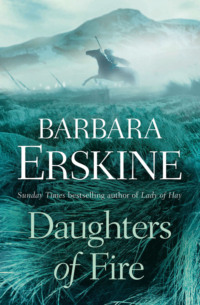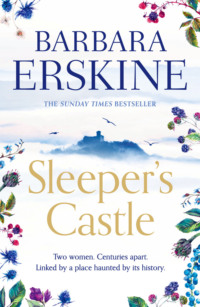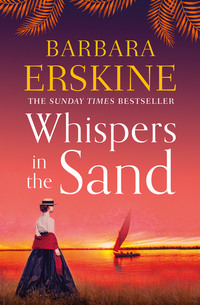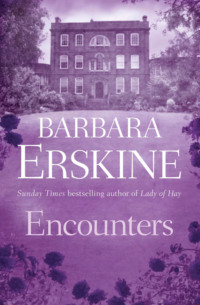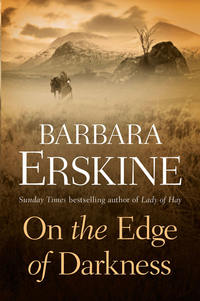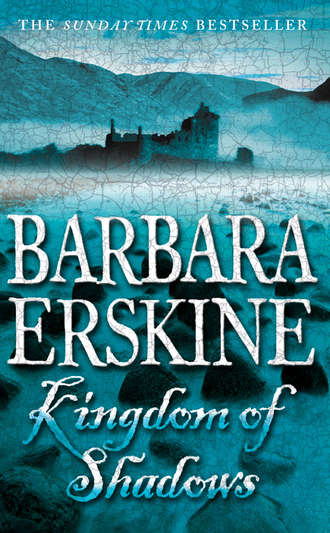
Полная версия
Kingdom of Shadows
‘Did you know what the old bat planned to do?’ Paul turned on her the moment they were alone in their hotel room after the reading of the will.
‘No, I didn’t know.’ Her voice was bleak. ‘She always said she would leave everything to us both. I was to get Duncairn – I’ve always known I’d get Duncairn – but I thought she’d leave me some money too.’
‘Some money!’ Paul lowered his voice. ‘Margaret Gordon was worth over one and a half million, Clare, in securities alone. With the farms another three at least.’ His handsome face looked drawn and pale as he caught her arm and swung her to face him. ‘And she left it all to James! You will have to contest it.’
‘No!’
‘No?’ He stared at her.
‘No, Paul. I won’t contest it. She’s right. You’re a wealthy man. My brother had nothing, nothing at all. He never even had a father. Daddy died before he was born!’
‘He had Archie –’
‘Archie hates us. He has always resented us for being there; he thinks of us as coming between him and Mummy – you know that as well as I do.’ Clare’s eyes were blazing. ‘No, that money is James’s by right. I have everything I want.’ Abruptly her anger subsided. She put her hands on Paul’s shoulders. ‘Come on, darling. We don’t need any more money.’
Paul caught her wrists and pushed them away. ‘Everyone needs more money, Clare. Duncairn’s worth nothing.’ His voice was harsh.
For a moment she stared at him, shocked, then she turned away and walked over to the window, staring down over the rooftops at the back of the hotel towards the distant Firth of Forth. ‘Well, it’s worth everything to me,’ she whispered. ‘Everything. Don’t you understand?’ She spun round. ‘It’s been in our family for seven hundred years!’
‘Then perhaps James ought to have it as well. He is, after all, the heir to whatever pretensions your family have to gentility, not you.’ Paul’s voice was deliberately cruel.
She gasped. ‘Paul!’
‘Well, it’s true. Or are you claiming some feminist right of inheritance because you are the eldest? Perhaps it is I who should have taken your surname when we married!’ His voice was heavy with sarcasm.
‘Well, at least it’s a name to be proud of!’ she flashed back at him, not caring suddenly what she said any more. ‘After all, what are you? The third son of a family who can’t trace their ancestors back more than one generation! I never could understand why you were so anxious for an heir. He’ll have nothing to inherit from you!’
‘Apart from the wealth which everyone keeps talking about, you mean,’ said Paul. His voice was ice-cold.
Clare stared at him, furious to find herself near to tears. To conceal them she turned back to her scrutiny of the rooftops, watching with anguished intensity a gull wheeling around the distant chimney-pots. She hunched her shoulders.
‘Apart from your wealth,’ she echoed.
‘So. At least I now know what you think of me,’ he went on quietly. ‘May I enquire why you lowered yourself so far as to marry me?’
‘You know why I married you!’ She didn’t turn round. ‘I loved you.’
‘Loved, I notice. Not love.’
‘Love, then! Paul, what’s the matter? What’s wrong with you? Why are you like this?’ Pushing herself away from the windowsill, she came to stand in front of him.
He stared at her. Her pale face with the expressive grey eyes and the dark frame of her hair never failed to make him catch his breath with its frail beauty. The frailness, of course, was misleading. Clare was as tough as old boots, even if she was a bit highly strung. He noted the tears on her cheeks now and felt a sudden twinge of contrition. He hadn’t meant to hurt her.
It was just that the disappointment and the anxiety had been so intense. Dear God! how he had relied on that money. It was to have been his life-line. His only way out of the hell he had found himself in. He could feel the sweat starting out on the palms of his hands just at the thought of what had happened. Abruptly he began to peel off his jacket. ‘If we’re to meet the others in the bar before lunch we’d better get ready,’ he said abruptly, throwing it down on the bed. ‘No doubt your brother will want to buy a bottle or two of Bolly to celebrate his little windfall.’
‘Paul –’
‘No, Clare. Don’t say another word. Not another word. I think you’ve said enough.’ Pulling off his tie he threw that down too before disappearing into the bathroom and slamming the door.
Clare stared after him in silence. She could feel herself beginning to shake. She was overwhelmed by a sense of utter loneliness, as though she had found herself suddenly in the room with a stranger. A stranger of whom she had been for a moment almost afraid.
Her gaze fell on the dressing-table where earlier he had thrown his car keys. Less than a minute later she had grabbed them and, with a glance at the closed bathroom door, let herself out of the room, and begun to make her way quickly down the hallway.
Dazzled by the blaze of the hot afternoon sun Clare had stared around at the castle ruins. Behind her the cooling engine of the British racing green XJS ticked quietly, pulled up on the grass at the side of the track. The cool wind carried the scent of the sea, sweetened by the dog roses which climbed the crumbling grey walls. Slowly she walked out along the promontory towards the cliff and cautiously peered over. Perhaps a hundred years ago railings had been put up across the massive breach in the walls where the seaward stones had begun to fall down the cliffs, but now they sagged drunkenly over the gap. She looked down towards the water, grey-blue and opaque, cold, even beneath the blazing June sky, and watched the gulls circling in the air currents. All round her the sound of birds was deafening; kittiwakes on the cliffs, their cries echoing off the granite shell of the tower, the yelp of a jackdaw hidden somewhere in the crumbling walls, a blackbird high in the rowan which grew in the space between the walls where once the chapel had stood.
The castle was deserted. Well off the tourist trail, and unsignposted, only the visitors to the hotel ever came here, and there were few enough of them. She glanced over her shoulder towards the grey stone walls of the Duncairn Hotel, nestling behind the deep windbreak of birch and fir. It was making a loss, that she knew, but it would be hard, very hard, to bring herself to change things. She loved Duncairn for its solitude, with the distant low silhouette of the hills behind it. A successful hotel would end that solitude overnight.
Slowly she strolled over the grass. In the centre of the walls someone had mown it roughly, just enough to make for easy walking amongst the ruins – Jack Grant at the hotel, she supposed. She would stay the night there before driving back to Edinburgh. It would give both her and Paul time to cool off. And she couldn’t face going back to Airdlie. Not now it belonged to James.
She was no longer shaking. She had expended her fury and her pain by hurtling up the motorway at over a hundred miles an hour, not looking or caring if the police were patrolling, and then on the long narrow road north. But she was still tense, still depressed after the ordeal of the formal reading of the will, knowing that she had been the only person in the room who truly and desperately mourned Margaret Gordon.
She jumped as a shadow fell across the grass near her and looked wildly round, but it was nothing: just the wind flexing and tossing the graceful branches of a birch. Slowly she began to walk round, every now and then reaching out to touch the warm, grey-pink stones of the castle walls as if greeting them ritually, taking possession of her inheritance. Picking her way through the thistles and rank grass and wild flowers towards the stone steps she climbed precariously up to what remained of the second floor of the old keep. The floor had half collapsed and two of the walls had gone, but one high rounded window on the seaward side remained intact and she made her way carefully to it, standing in the embrasure, her hands on the sun-warmed sill, looking out to sea. There was a bank of mist out over the water now, pearly in the diffused sunlight.
A man was standing watching her from about twenty feet away, leaning against the crumbled remains of the eastern tower. Instinctively she drew back into the shadow of the window arch. He must be a guest at the hotel, she supposed. She studied him covertly, noting the patched khaki sweater, the threadbare cords and the more-than-serviceable binoculars slung around his neck. He was a tall man, in his mid-thirties perhaps, good-looking in the rugged Scots fashion; very fair. And he was an intrusion. She felt a wave of resentment at his presence. She needed to be alone. Angrily, she turned back and descended the steps once more, conscious that she was in full view of him. She wondered suddenly what he must make of her, still dressed for the Edinburgh solicitor in a dark blue silk dress with court shoes, scrambling over the ruins. Only her hair was appropriate now, torn from its neat style by the wind and whipped into wild tangled curls.
She expected him to retreat as she walked near him, but he didn’t move. Folding his arms, he leaned comfortably against the wall, and she thought she saw a flash of grim humour in his eyes as she walked past him, her heels catching in the grass and stones, before he turned away.
It was as she was making her way slowly back across the high bank of turf which covered one of the collapsed walls that she felt it. Suddenly, from nowhere, a wave of grief and despair swept over her, so tangible that it stopped her in her tracks. She shivered violently, staring round. It was as if the mood came from outside herself, an atmosphere borne in on the cold wind. Behind her, the banks of mist had drawn closer and the haar was beginning to come in off the sea, drifting soundlessly up the huge granite cliffs, lapping amongst the fissures in the stone. Even the birds had fallen silent.
She found she was holding her breath, her fists clenched so tightly she could feel the slippery perspiration on her palms, and she glanced up at the sun. Moments before it had been shining hotly down out of a blue sky. Now it was a cold white disc, shrugging into the mist banks and out of sight.
For no reason she was suddenly afraid.
In spite of herself she glanced back over her shoulder towards the stranger, seeking the comfort of another human presence. He was standing now beneath the rowan tree, staring up at the broken arch of the high window which had once dominated the chapel. And, without even seeing his face, she knew that he too had felt something of the cold shadow which had crossed the castle.
Lost in her meditation Clare frowned, guiding her mind back into the sunlight as she had been taught, driving away the North Sea haar which had cast its cold fingers over Duncairn, driving away the despair and fear which had persisted until she retraced her steps to the car and drove on to the hotel. She had not seen the stranger again.
Sarah Collins was in the kitchen polishing the silver when the phone rang. She waited meticulously for four rings, to see if Clare was going to answer it upstairs, then she picked up the receiver.
‘Hello, Mrs C. It’s Emma Cassidy. Is Clare around?’
Sarah frowned. She resented deeply being addressed by anything other than her proper name. ‘I believe she’s upstairs, Mrs Cassidy. If you wish, I’ll call her.’ She didn’t wait for a reply. Dropping the receiver on the work top with a rattle designed to illustrate her irritation, she began to walk slowly towards the stairs.
The door of the master bedroom was shut. Sarah listened for a moment, her ear almost against the wood panelling, then very gently, she knocked.
There was no reply. She pursed her lips slightly and was about to turn away when on impulse she gripped the handle and twisted it quietly until with a click the latch slid back and the door opened. Clare was still seated on the floor, her legs crossed, her hands resting loosely on her knees. Her eyes were shut. Sarah watched in horrified fascination, noting the candle, the wax dripping slightly on the side away from the gently blowing curtains, the pale ice-green bathrobe slipping so that it revealed one long tanned thigh and most of Clare’s left breast. Her breathing was deep and completely regular, her body relaxed, her face a picture of calm serenity. Sarah shivered. It might be an Indian summer in the garden, but in this shaded bedroom, it was suddenly very, very cold.
Turning, Sarah almost ran from the room, pulling the door closed silently behind her, then she hurried back down to the kitchen. Her hands were shaking as she grabbed the phone. ‘I’m sorry, Mrs Cassidy, but I can’t find her. She must be outside somewhere. Shall I get her to call you back later?’
She did not wait for Emma to ring off. Slamming down the receiver, she took a deep breath, then picking it up again, she began to dial.
She was put straight through to Paul’s office. Gripping the receiver tightly in her left hand she glanced nervously towards the kitchen door. ‘She’s doing it again,’ she whispered into the mouthpiece. ‘Now, this minute. The candle and everything.’
‘It’s good of you to ring, Mrs Collins.’ At his desk in the dark oak-panelled room, Paul stood up slowly. ‘But I don’t think there is any cause for alarm. I gather contemplation of a lighted candle is a well-known meditation technique.’
Sarah took another deep breath, clearly audible down the phone. ‘I think it is more than meditation,’ she said darkly. ‘I’ve seen meditation on TV and when that dreadful man Zachary came over here to give her those lessons, what he showed her was quite different. What Mrs Royland is doing is wrong. It’s very, very wrong.’
Paul leaned against his desk wearily. ‘In what way wrong, Mrs Collins?’
She bit her lip, rubbing her fingers distractedly through the iron set of her hair. ‘It’s just wrong,’ she repeated stubbornly. ‘You must stop her doing it, Mr Royland.’
‘I doubt if I could do that.’ She heard with surprise the bitterness in his wry laugh. ‘I doubt if I could stop Clare doing anything she really wanted to.’
He hung up and stood looking down at the telephone for several minutes, without seeing it. Then he threw himself down once more into the deeply-buttoned leather desk-chair, gnawing his thumb. His office was large, with panelled walls hung with oils of former directors of the bank. When, as now, the sun was not shining directly into the window, it was a dark, depressing room.
The sound of the phone interrupted the silence once more, he turned back to it, irritated.
‘Paul, I would like you to look in, if you would, when you come back this weekend.’ It was the Roylands’ doctor, John Stanford.
Paul frowned, automatically reaching for his diary. Then he pushed it aside without opening it. ‘What is this all about, John? Do I gather it is not a social call?’
‘I’ve had the results of the tests we ran on you and Clare. I’d like to discuss them with you before I talk to you both together.’
Paul closed his eyes. Slowly he sat back in the chair.
‘Which is as good as saying that we have a problem. And as you want to see me, I gather it’s in my department?’ He took a deep breath. ‘Come on, John. Don’t pussyfoot with me. I don’t need anyone to hold my hand and look into my eyes while they talk to me. You can tell me over the phone.’
‘Very well.’ There was a pause as though John Stanford, far away in his Suffolk surgery, was choosing the right words. ‘It is the sperm count, Paul. It is low. Very low. We could repeat the tests yet again, but the results are coming consistently. I’m afraid that it is very unlikely that you would ever be able to father a child. Under the circumstances, I think we can rule out the need for any further tests on Clare.’ There was a long silence. Then, ‘Paul? Are you there? Listen, we should discuss the situation. Will you look in anyway when you get back? There are avenues you should consider pursuing at this stage.’
‘You mean it’s curable?’ Paul was twisting a pencil between his fingers.
‘No, Paul. I’m sorry. But there are other ways. Adoption, artificial –’
‘No!’ Paul slammed his fist down on the desk. ‘If it is irreversible, then there is nothing to discuss, John. Nothing. Forget it. Do you understand. And John, I forbid you to tell Clare, or discuss this with her at all. Is that completely clear? I absolutely forbid it. I will tell her myself when the right moment comes.’
He put the phone down and stood up. The bottle of Scotch in the drinks cupboard in the corner of the office was still unopened. Breaking the seal he unscrewed it, pouring himself half a tumbler and sipping it slowly, his mind mercifully blank as he walked over to the window and stared down into Coleman Street. The traffic was at a standstill, the pavements crowded.
He had been watching for several minutes when slowly his attention focussed on the far side of the road. A woman was standing there waiting to cross. She was holding a small boy by the hand. As they waited, the child began to jump up and down with excitement, looking up at her, and he saw the woman’s face as she smiled down at him. It held an expression of such tenderness that for a moment he found himself biting his lip.
With a groan he turned from the window and hurled the whisky glass across the room.
2
Emma Cassidy was in the bath when her brother rang. Wrapped in a dark green bath sheet she sat down on the edge of her bed.
‘Hi, Paul. How are things in the City?’
‘Much as usual.’ He sounded depressed. ‘Em, I want to talk to you about Clare.’
‘Oh?’ Emma was suspicious.
‘You know she’s got very involved with this yoga stuff. She’s taking it very seriously.’
‘That’s a good thing, surely.’ Emma threw herself back on the heaped pillows. Downstairs, her daughter Julia was sitting watching children’s TV. For five minutes the house was peaceful. ‘I’ve done some yoga myself. It did wonders for my figure.’
‘No doubt. But she is doing it because she is obsessed with this idea of having a baby.’ Paul’s voice was hard. ‘It’s crazy. She must stop thinking about it. I am sure now in my own mind that children would not be a good thing. Not for us. We manage fine without that encumbrance in our lives and we’ve got to find a way to put an end to this obsession of hers.’
There was a short silence, then Emma laughed uncertainly. ‘My God, Paul. I thought it was you who kept on about having a son all the time. It was you who was making poor Clare feel so bad about it.’
‘In which case I must disabuse her of the idea.’ Paul was abrupt. ‘I’ve changed my mind.’
Emma sat up straight. She frowned. ‘Has something happened, Paul? What is it?’
‘I’m thinking of Clare. She’s been under a lot of strain.’ He sounded repressive. ‘And she is taking this yoga too far. I don’t like the sound of this man who has been teaching her, or the thought of him wandering around my house. He is beginning to get her involved in some weird practices.’
‘Really?’ Emma gave a breathless laugh. ‘You know, I think I like the sound of that. I wonder if they’d let me join in!’
‘I’m being serious, Emma. Something has to be done, before it gets out of hand. I want you to try and talk her out of this whole stupid business.’
‘Why me, Paul? Why can’t you do it?’ Emma was serious again.
‘Because she won’t listen to me. You know what she’s like. She can be so damn stubborn.’
Emma frowned. ‘I always thought you two could talk, Paul. Have you been quarrelling again?’
‘We have not.’ He was growing exasperated. ‘Just help me in this, Emma! You have always got on well with her. She’ll listen to you. I have to nip this thing in the bud. When did you last speak to her?’
‘I tried to ring her at Bucksters today, but your terrifying Mrs C. said she was out. I’ll try again when she comes up to town tomorrow. We’d vaguely arranged to meet on Friday anyway. But Paul, surely yoga isn’t bad? I don’t understand why you’re so worried about it.’
‘It’s not the yoga as such, it is what goes with it: it’s the meditation this man is teaching her, the mind bending, the attempts to conjure a child out of the air –’
‘Is that what she is doing?’ Emma was horrified. ‘Oh, Paul, that’s terrible. Tragic.’
‘Exactly. So will you help me?’
‘You know I will. Oh poor Clare, that’s ghastly.’
She looked up at Julia who, bored with television, had wandered into the room, chewing on an apple, and suddenly her eyes filled with tears.
Rex Cummin was standing on the balcony of his penthouse flat in Eaton Square. It was eight in the morning and the air was still cold as he absently studied the trees while waiting for his car to arrive outside the front door four floors below.
‘Here’s the mail, honey.’ His wife stepped out next to him with a handful of letters. They were a good-looking couple in their mid-fifties, both immaculately and formally dressed for the day. ‘Do you want me to fetch you some breakfast before the car gets here? Louise is late again, I’m afraid.’
He looked up from thumbing through the pile of envelopes. ‘Don’t be too hard on that kid, Mary. She’s efficient enough, and she has a long way to come on the bus. Toch!’ He gave an exclamation of disgust and handed the post back to her. ‘Still nothing from that Scotch solicitor! Dammit, Mary, when is that woman going to answer him?’
‘You only instructed him to make an offer for the estate last week, honey.’ She did not have to be told what he was talking about. ‘It could take months for them to get round to discussing it.’
She noticed with a worried frown that he had clenched his fists and that the vein in his temple was beginning to throb again.
‘Months is no good!’ he shouted. ‘Sigma has got to have that land all signed and sealed before any breath of suspicion about the secret seismological surveys leaks out. Hell, Mary, what we’ve been doing is strictly against the law in this country. You can’t go round doing surveys on other people’s property without permission. We’ve got to cover ourselves. That’s why this place is so perfect. We make Mrs Royland a good offer for that hotel – which must be losing her thousands a year. OK, so everyone realises why we did it later, but by then it will be too late. My God, even Bob Vogel in Houston isn’t on to the implications of those surveys yet.’ He slapped his fist into his palm. ‘And we have to wait for some goddam British solicitor to ass about –’ He winced suddenly, his hand going to his diaphragm.
His wife’s practised eyes missed nothing. ‘I’ll get you some Maalox, honey, it’ll line your stomach.’ She turned back towards the windows. Then she hesitated. ‘Did you make offers on any of the rest of the properties in that area?’ It was a seemingly innocent question.
He shook his head. ‘There are going to be problems with the rest. Most of it is owned by the National Trust for Scotland and people like that. We’ll put in bids later if the British government gives us exploration licences. Besides, those test bores may not strike so lucky –’ He paused thoughtfully. ‘No, Duncairn is perfect. The test results; it’s privately owned; and there’s the hotel – the perfect excuse for the offer. My God, Mary, do you know there’s even a ruined castle!’
‘I know, Rex. You already told me.’ Did he really think she could have forgotten? The letters from the Scottish American societies, the passionate delving into his ancestry, the genealogists in London and Edinburgh, the excitement when he found that he might be descended from an ancient Scots family; a family who had once owned amongst many others a castle on the wild north-eastern seaboard of Scotland, a castle which now was possibly sitting on seven million or so barrels of oil. She smiled indulgently. ‘Now, you promise me you’ll eat something on the plane.’
‘Sure, honey.’ He was impatient. ‘And you call me, at once – at once – if that letter comes.’
‘Of course.’ She walked ahead of him through the wide open full-length windows into the large drawing room with its modern tubular steel and glass furniture.




